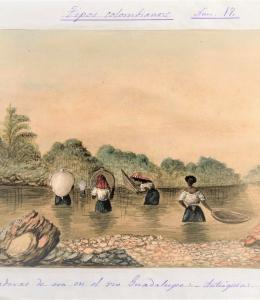
Dr Paola Vargas Arana - https://orcid.org/0000-0003-1553-5377
Postdoctoral Fellow, November 2022 - September 2023
Home Institution: University of Edinburgh
A IASH fellow from the History department of Edinburgh University, her research focus on how the African population combated enslavement in the northern region of South America, which currently comprises Colombia, Panama, and Venezuela, looking forward to understanding how the Africans’ responses impacted the ongoing colonization in this region, as well as seeking to connect their struggles with the socio-political and economic processes happening in their African regions of origin. Dr Vargas Arana was previously a Newton International Fellow at King’s College London, holds a PhD in Social History from the Federal University of Rio de Janeiro and an MA in African Studies from El Colegio de Mexico. She has been a Visitant Researcher at the Centro de Historia of Lisbon University and participated twice from the Brown University Research Institutes BIARI.
Latest article: “The Resistance of West African Women in the Antioquia Mines of New Granada” Regenerated Identities, Documenting African Lives, P. Lovejoy, et al. (eds.), New Jersey, Africa World Press, 2022, pp. 223-250.
Podcast The Uprising of Afro-Colombians: https://acaudio.com/publication/1432
Project title: Life journeys of Africans in the Antioquia gold mines of New Granada during the British asiento (1713-1750)
This research concentrates on archival material containing biographical data of displaced African women and men who were taken to the province of Antioquia, in New Granada (presently Colombia), between 1713 and 1750. The aim is to reconstruct their life histories based on manuscripts not examined previously but which reveal the origins of the enslaved population, including details on ethnonyms, languages, body marks (including branding), cultural traits, routes that people had to follow, and the merchant companies involved in their displacement. This primary evidence will be examined in the context of a broad range of sources and historiography to explore how British and more particularly Scottish companies got involved in the slave trade operating in specific regions of West and West Central Africa to supply workers to the province of Antioquia in New Granada.
The research involves dialogue with the Institute Project on Decoloniality by decentring the global north geography through focusing on Colombia and decentring the attention on elites to analyse African oppressed populations, thus contributing to the re-humanization of the victims of the transatlantic slave trade. After all, the slave trade occurred over four centuries and involved a major part of the Atlantic world, although little is known about the Africans who suffered the damage directly. As such, it promotes research intended pedagogically to repair collateral effects of transatlantic slavery, including understanding the omissions and prejudices produced by the humanities about the subject and about racialized population up to the present. This will allow informing much-needed educational reparations to overcome the “crime against humanity” constituted by transatlantic slavery, according to the Durban United Nations declaration.
